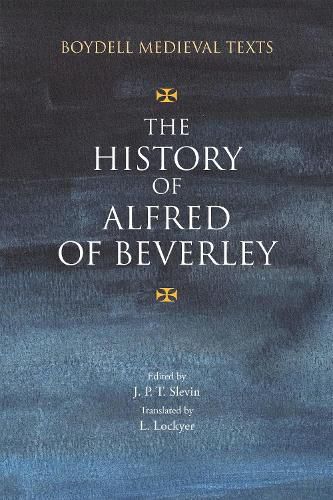Readings Newsletter
Become a Readings Member to make your shopping experience even easier.
Sign in or sign up for free!
You’re not far away from qualifying for FREE standard shipping within Australia
You’ve qualified for FREE standard shipping within Australia
The cart is loading…






The history of the Yorkshire secular clerk, Alfred of Beverley (c.1149 x c.1153), an important primary source in Anglo-Norman historiography, supplies a history of Britain from its supposed foundation by Brutus down to the death of Henry I in 1135. Alfred’s history is of particular interest in that it is the first Insular Latin chronicle to incorporate the legendary British history of Geoffrey of Monmouth (published c.mid 1130’s) within a continuous account of the island’s past. In attempting to fuse the radically new Galfridian account of the past with that of the conventional twelfth-century (Bedan) view, Alfred’s use and manipulation of his sources is highly revealing and suggests a quite critical reception of Geoffrey’s history, a mindset which by the end of the twelfth century appears almost entirely to have disappeared amongst chroniclers.
Alfred’s history is also an important, and presently undervalued, witness to the reception and dissemination of three of the most important Anglo-Norman histories: Symeon of Durham Historia Regum, The Chronicle of John of Worcester and Henry of Huntingdon, Historia Anglorum, from which works it borrows extensively. In the manner of use of these sources, the author tells us much about the ecclesiastical and intellectual interests and outlook of the period.
$9.00 standard shipping within Australia
FREE standard shipping within Australia for orders over $100.00
Express & International shipping calculated at checkout
The history of the Yorkshire secular clerk, Alfred of Beverley (c.1149 x c.1153), an important primary source in Anglo-Norman historiography, supplies a history of Britain from its supposed foundation by Brutus down to the death of Henry I in 1135. Alfred’s history is of particular interest in that it is the first Insular Latin chronicle to incorporate the legendary British history of Geoffrey of Monmouth (published c.mid 1130’s) within a continuous account of the island’s past. In attempting to fuse the radically new Galfridian account of the past with that of the conventional twelfth-century (Bedan) view, Alfred’s use and manipulation of his sources is highly revealing and suggests a quite critical reception of Geoffrey’s history, a mindset which by the end of the twelfth century appears almost entirely to have disappeared amongst chroniclers.
Alfred’s history is also an important, and presently undervalued, witness to the reception and dissemination of three of the most important Anglo-Norman histories: Symeon of Durham Historia Regum, The Chronicle of John of Worcester and Henry of Huntingdon, Historia Anglorum, from which works it borrows extensively. In the manner of use of these sources, the author tells us much about the ecclesiastical and intellectual interests and outlook of the period.